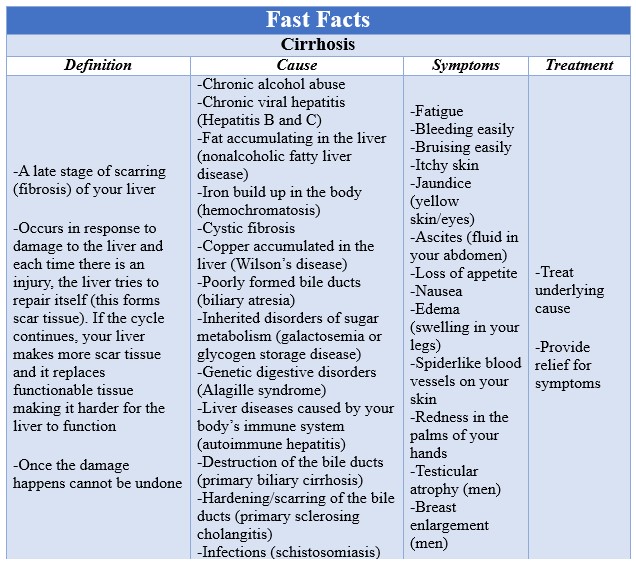What is wrong with your liver?
You’ve probably heard the word “cirrhosis” at some point, especially lately thanks to television commercials. Otherwise, it is usually one of those things that you have a distant relative or a friend of a friend who has it. You might know that it has something to do with your liver, but what does it actually mean? Is it something that you should be concerned about?
 Definition
Definition
Cirrhosis is a late stage of scarring (fibrosis) of your liver. In order to understand the severity of cirrhosis, we need to take a look at the importance of your liver. The liver has numerous jobs that help our body to function. The most significant is to filter the blood coming from the digestive tract, before passing it to the rest of the body. Also, it detoxifies chemicals (ex. alcohol), metabolizes drugs, produces bile for the breakdown of fats, converts glucose (the sugars we ingest) to glycogen (stored sugar), stores vitamins and minerals (Vitamin A, D, E, & K) responsible for producing cholesterol and makes proteins important for blood clotting. Your liver is vital to your survival and this is why having cirrhosis can be toxic to your body.
Cirrhosis occurs in response to damage that happens to your liver. Each time there is an injury, your liver tries to repair itself. This process forms scar tissue and if the cycle continues, your liver makes more scar tissue. The scar tissue replaces functionable tissue and makes it harder for your liver to perform as it should. Unfortunately, once the damage has taken place, it cannot be undone. If diagnosed early enough, it can be treated and prevent further damage from happening. There are numerous causes for cirrhosis. The three most common are chronic alcohol abuse, chronic viral hepatitis (Hepatitis B and C) and fat accumulating in the liver (nonalcoholic fatty liver disease). Some other common causes include iron build up in the body (hemochromatosis), cystic fibrosis, copper accumulated in the liver (Wilson’s disease), poorly formed bile ducts (biliary atresia), inherited disorders of sugar metabolism (galactosemia or glycogen storage disease), genetic digestive disorders (Alagille syndrome), liver diseases caused by your body’s immune system (autoimmune hepatitis), destruction of the bile ducts (primary biliary cirrhosis), hardening/scarring of the bile ducts (primary sclerosing cholangitis), infections (schistosomiasis) and medications (methotrexate).
Symptoms of cirrhosis don’t appear until liver damage is extensive. This can include fatigue, bleeding easily, bruising easily, itchy skin, jaundice (yellow skin/eyes), ascites (fluid in your abdomen), loss of appetite, nausea, edema (swelling in your legs), spiderlike blood vessels on your skin, redness in the palms of your hands, testicular atrophy (men) and breast enlargement (men). Besides these symptoms, there can be severe complications associated with cirrhosis.
Most of these are life-threatening and need immediate treatment. Your spleen can become enlarged (splenomegaly) and this puts you at increased risk for internal bleeding. You are also at higher risk for developing liver cancer. You could have high blood pressure in the (portal) veins that supply your liver with blood flow, this is known as Portal Hypertension. Toxins can build up in your brain since your liver is unable to filter them out of your bloodstream, causing Hepatic Encephalopathy. Tiny internal blood vessels, typically in your esophagus, can rupture causing bleeding and are known as varices. If you have any of these, you are considered to be in decompensated cirrhosis, which is life-threatening. Please see Fast Facts for more information on symptoms for each one of the conditions.
Treatment
Treating cirrhosis means treating the underlying cause. Since one of the primary cause of cirrhosis is chronic alcohol use, the treatment for this usually involves getting help for alcohol dependency. It is essential to not drink any alcohol for any reason if you have cirrhosis because it will only further damage your liver. For people who have cirrhosis due to nonalcoholic fatty liver disease, by losing weight and controlling your blood sugar levels, it can help improve the symptoms (remember to maintain adequate protein intake while attempting weight loss). If your cirrhosis is caused by Hepatitis, your doctor can prescribe medications to help treat these infections and this will help to improve your cirrhosis. Similarly, there may be medications available to treat other underlying causes of your cirrhosis. There are also medicines that can treat certain symptoms (itching, fatigue, pain) to improve your quality of life.
Prevention
The best thing that you can do is to prevent yourself from getting cirrhosis. In order to do this, you should maintain a healthy weight and exercise frequently. Do not ingest chemicals that your liver will need to detoxify…this means drink alcohol sparingly. Take measures to prevent yourself from getting infections (hepatitis) that can affect your liver, such as getting screened to see if you have it or getting the vaccine to prevent it. Be aware of medications that can be toxic to your liver. Any time you are prescribed a new medication ask your doctor the potential impacts that it can have not only on treating what it is intended to, but elsewhere in your body (liver, kidneys, etc.).
Cirrhosis is a serious condition that needs to be managed. It is preventable, but we must be aware of what we do and how it impacts our liver in order to be able to do this. If you have any questions about cirrhosis, please speak with your doctor. If you would like further information, please visit the American Gastroenterological Association’s cirrhosis page at https://www.gastro.org/practice-guidance/gi-patient-center/topic/cirrhosis